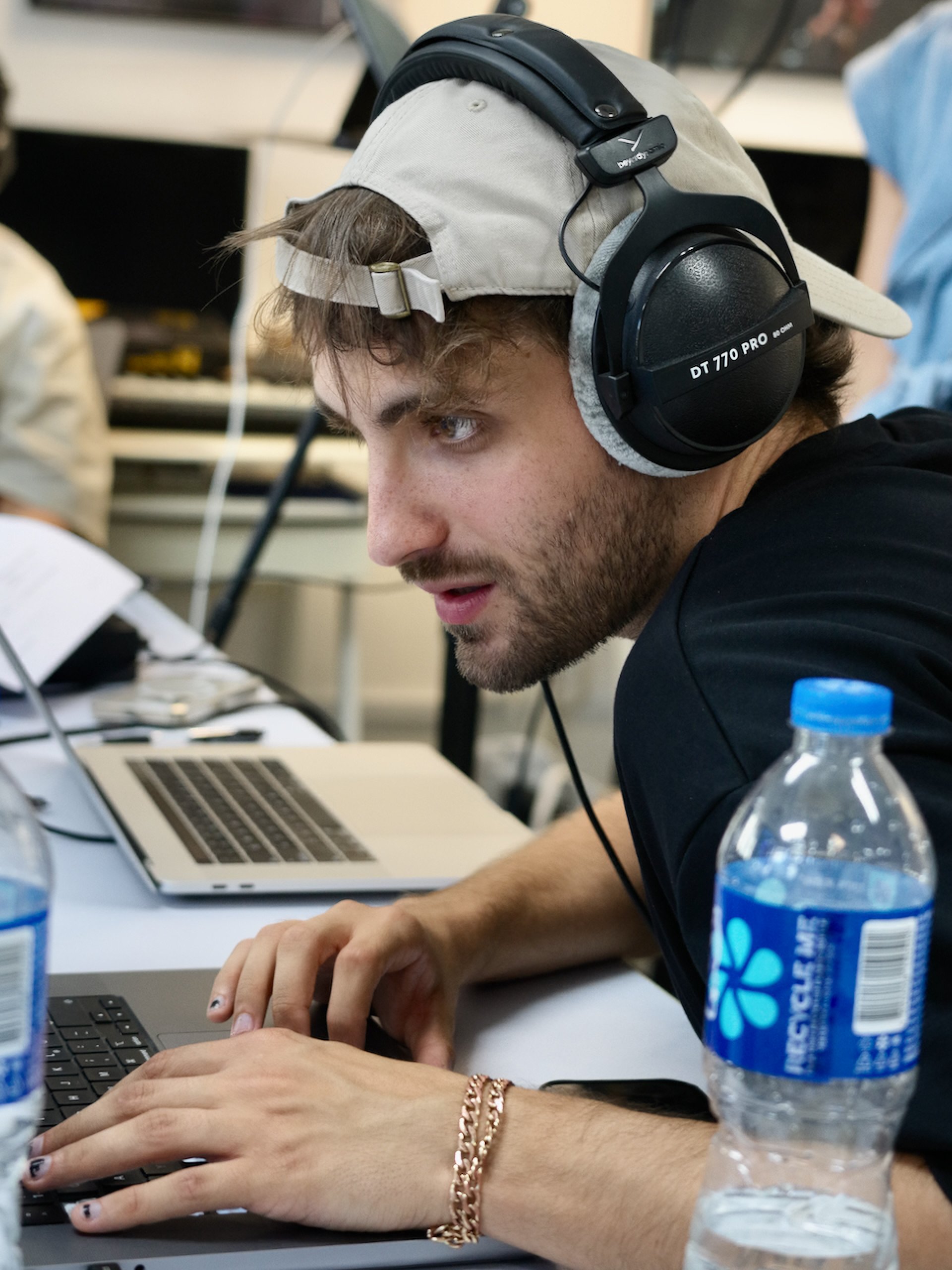Hailing from Berlin, Beijing, Tokyo, Stockholm and Los Angeles, the musicians were in Hong Kong for a songwriting camp put together by Universal Music’s publishing arm, which had expanded its operations in China with a state-of-the-art office in Shanghai a little less than two years earlier.
For a week, the creatives started their workdays at 10am and wrapped up at 7pm – often much later. They made songs that might end up in the hands of some of the world’s biggest performers, such as BTS.
At the wrap party, songs written over the week were played and, it was hoped, maybe sold to the label, too.
Blackpink, Le Sserafim, Ateez: how K-pop is taking over Coachella
Blackpink, Le Sserafim, Ateez: how K-pop is taking over Coachella
Over two hours, I heard some first-class tunes, and chatted with creators, organisers and executives, including Joe Fang, Universal Music Publishing Group’s (UMPG) first-ever managing director in China, who has since left his position.
One thing was clear: the emergence of a youth-supported Chinese music industry has attracted artists from all over the world to explore opportunities in the region.
After the wrap party and a big night in Lan Kwai Fong, I spoke individually to Billboard chart-topping songwriter Chris James, TikTok sensation Gaston Pong and multi-instrumentalist Chiyo about the journeys that had led them to Hong Kong that week.
Chris James

In 2020, Berlin-based singer-songwriter Chris James knew he had a hit on his hands when his home-made music video for “Not Angry”, a breezy break-up number, was flooded with comments from Chinese fans bearing the unexpected news that the English-language tune had blown up on Douyin – the Chinese version of TikTok.
The then-25-year-old German-American who made music from his bedroom had never been to Asia. Before seeing some of the 1.8 million clips of people singing and dancing to his guitar banger on Douyin, he had also never heard of the platform.
“I made that record within two weeks and dropped it independently and [the success] just randomly happened,” says James, bright-eyed in his plant-filled flat in the German capital, from where he beamed in via video call. “I still have no idea why it happened or how it happened, but it happened.”
Three years later, the melodious chorus where James sings, “I’m not angry any more, just a little bit let down” – is still rolling off the tongues of millions of Chinese youngsters.
It’s not necessarily about finding the market, but the market finding you – through coincidences my music just ended up in Asia
Chris James
It was “surreal” to witness the tune’s popularity, he says, marking billions of “uses” on Douyin, and more than 30 million plays on Spotify since.
“Not Angry” brought about a “mind-blowing” six-city tour in China in summer 2023, playing Beijing, Shanghai, Chengdu, Guangzhou, Shenzhen and Hangzhou – all sold-out. The modest five-person crew consisted of his drummer, bass player, guitar player and manager, two of whom were his old roommates.
While creating the set list using data from Chinese streaming platforms, James was surprised by how similarly his fans at home and those in China responded to his music.
“It’s really fun to see that even though [Chinese and Western streaming platforms] are not connected, people naturally gravitate to certain songs in the same ways, which means those are just good songs,” says James, who has since written songs for some of the world’s biggest artists, such as Korea’s BTS and German rock legend Udo Lindenberg. His work as a writer now exceeds 1 billion streams on Spotify.

Most listeners of James’ “guitar-based chill pop music” – as he describes it – come from China, Thailand, Malaysia and Indonesia, and luck plays a huge part, he says.
“It’s not necessarily about finding the market, but the market finding you – through coincidences my music just ended up in Asia. It feels very natural to keep going and keep expanding [in the Chinese market], so it’s 100 per cent on our plan right now to be there more often and connect with people that actually listen to the music […] This is the first time in my career where I don’t feel like it’s an uphill battle.”
Now active on almost all Chinese social media platforms, from traditional sites such as Weibo to visual-focused apps like Douyin, Bilibili and Xiaohongshu, James is looking to “give the music a little more depth” for his Chinese fans.
“I have so much content that I’ve made over the years that has never made it to China, so for me it’s really cool to be able to tell the story from the start for people who’ve missed out on it,” says James, adding that he works with a Chinese agency to ensure that his content is culturally sensitive.
“I think it’s really important [for foreign musicians] to be respectful of the cultural context they’re going into.”
Gaston Pong

An all-round musician who rocks a blond, spiky head of hair, 26-year-old Gaston Pong had his start in the arts as a toddler signed onto a children’s record label.
A decade before legitimising his musical talents, the Kuala Lumpur native already had a string of nursery rhyme albums under his belt.
As a young man he found himself in Beijing with a record contract, but the Covid-19 pandemic, among other factors, put a halt to what could have been a short cut to stardom.
Then, independently, he secured a hit remaking Taiwanese supergroup S.H.E.’s 2006 banger “Ring Ring Ring”. His rendition, which he self-produced, has amassed a staggering 1.9 billion streams in China.
Every time I come to different Chinese cities, it gives me this really unique sense of connection, because growing up, we are so familiarised with the Chinese language
Gaston Pong
Speaking with me at Win Win Shop, a record store in Mong Kok, where a diverse selection of vinyls from veteran and emerging musicians are lined up systematically, Pong says China is a “tastemaker” that has churned out numerous high-quality productions.
“Based on my knowledge and looking at the statistics behind streaming apps, Chinese songs make up the biggest portion of Asian songs being streamed in the United States, Australia and in other sizeable countries,” says Pong, who runs his own entertainment company.
A Mandopop artist himself, Pong has amassed 1.2 million followers and 19 million likes on TikTok; 309,000 followers on Instagram and 484,000 subscribers on YouTube. They come from his homeland, Malaysia, Thailand, Taiwan and mainland China.
“Every time I come to different Chinese cities, it gives me this really unique sense of connection, because growing up, we are so familiarised with the Chinese language,” says Pong,
His Chinese-Malaysian upbringing allowed him to explore how different languages interact with each other musically, he says.
“We consume so many [Chinese] cultural products, from television shows to radio that plays Cantopop music. Or even the records themselves, we can buy them in Malaysia. So when we arrive in Chinese regions, it just feels like we’re at home,” says Pong, as he browses the CD shelf and finds a copy of Ariana Grande’s 2016 album, Dangerous Woman.
Pong had heard Grande’s chart-topping record months before the world did, when he was a marketing and public relations intern at Universal Music Malaysia, while studying mass communications at the International Advertising, Communication and Technology College, in Petaling Jaya, a city neighbouring Kuala Lumpur.

It took Pong years of producing for himself and his sister, JE Pong, before he was again scooped up by Universal Music, this time as a musician.
The siblings, who together released music under the name “Pong Pong”, launched Pong Entertainment, which also manages Malaysian dancer Caedon Yeong.
Pong has since penned a handful of hits for well-established artists, including fellow Malaysians Priscilla Abby and Namewee, Singapore’s Alfred Sun and Taiwan-based Janice Yan Yige, aka the voice behind the Mandarin version of The Little Mermaid’s “Part of Your World”.
Writing for regional singers aside, Pong is expanding beyond bilingual pop songs and dabbling in fully English music, with a playful R&B flair.
In 2023, he released two love songs, “Birthday Cake” and “i luv u, just kidding”, which together have racked up a million plays on Spotify.
Chiyo

Born to a Shanghainese mother and a Tokyoite father, emerging songwriter Chiyo is no stranger to an international lifestyle.
She recently made the move from Beijing to Taipei – into a two-storey apartment-slash-production studio, where she zoomed in for a candid conversation about her experience in the industry.
The vocalist, who also plays the piano and clarinet, studied liberal arts at Tokyo’s Waseda University.
The flexible nature of the course allowed her to further her passion for music, which she pursued in high school. Her first break came in 2015, when she joined Japanese girl group Def Will – meaning “definitely, we will”.
She wrote and produced for the quintet alongside Komuro Tetsuya – one of Japan’s most successful record producers.
Def Will’s debut single, “Lovely Day” (2016), a pop song about seeing life through a positive lens, was one of Chiyo’s first published works.
In China and Japan, we tend to seek emotional support from music – we don’t only groove to the music, we have to cry with the music
Chiyo
The group disbanded three years later, which was when Chiyo returned to China and began competing in hit music programmes, including Come Sing With Me, Produce Camp and Super Girl, where the likes of Chris Lee, Sitar Tan and Jane Zhang got their start.
These appearances also earned her 2 million followers on Weibo, with her listeners scattered across Japan and Chinese-speaking regions.
“In China, the most important thing for an artist is to get on television shows – if you want people to see you,” says Chiyo, 29. “The audience is spread out, so it’s really hard to gain fans being based in just one city or region.”
Programmes such as The Rap of China have elevated what had been a largely underground musical genre into the mainstream.
“Whatever the television shows want to highlight, it becomes a trend,” says Chiyo.
Rap has since become one of the fastest-growing genres in China.

While most of Chiyo’s songs were written for herself and her former band, she recently produced Taiwanese pop star Rainie Yang Cheng-lin’s love ballad “Eternal Future With You”.
It was the theme song of the Chinese film Yesterday Once More (2023), a romance starring rising actors Chen Feiyu and Zhou Ye.
“In music, instead of trying to show how skilful you are, you should show how honest you are,” says Chiyo. “The most important thing is to touch the heart of the audience.”
Having grown up in Shanghai, and lived in Beijing and Tokyo, Chiyo says musicians exploring a foreign market should immerse themselves in the local culture – not just the music scene, but the people’s way of life.
“To touch people in a market, you have to actually talk to people there,” says Chiyo. “My suggestion is to go and hang out with people – not only with other idols, singers or songwriters – then you can see what topics and words hit their hearts, then you write that into your lyrics.”
There are also fundamental differences in how Western and Asian audiences appreciate pop music, especially in the weight they place upon lyrical substance. It could therefore be “really hard” for people with Western music tastes to “get” C-pop and J-pop, she says.
“In China and Japan, we tend to seek emotional support from music – we don’t only groove to the music, we have to cry with the music, so the lyrics have to touch your heart, you actually have to read a lot of books to write [good] lyrics.”
Leo1Bee on his new album Wilderness and redefining Chinese R&B
Leo1Bee on his new album Wilderness and redefining Chinese R&B
Having a good grasp of the language is important in both C-pop and J-pop, which retain much of their cultural and linguistic elements despite the infusion of Western sounds.
In contrast, K-pop, which is based heavily on Western styles and uses a lot of English words, would be more palatable to Western audiences, she says.
While the Chinese market is still largely fixated on “slow-tempo ballads with really touching lyrics”, Japan offers diversity, where there is an audience for every type of music, including those that are non-mainstream, such as punk rock.
Nonetheless, Chiyo sees China’s potential to become a global music hub that gathers musicians from all over, namechecking Chengdu, the hip hop capital, and Shanghai, where “music is seen as a way to express fashion”.
Going for a song
“The easiest part is when they come into the room,” says Joe Fang, who, until leaving his post recently, had overseen the development of more than 10 songwriting camps in mainland China as the managing director of UMPG China.
His team began preparation for the Cross Point songwriting camp in Hong Kong a month and a half ahead of time.
It could not be too early, as the talents have little grasp of their schedules months in advance, but it also couldn’t be too late, as Fang wants them to be mentally prepared when they arrive.
“The most challenging part is the preparation, because people don’t necessarily know each other or have experience writing with others, especially in a foreign place,” says Fang. “So we need to get everyone on the same page before they actually come.”
Besides Pong, James and Chiyo, Cross Point was also attended by Batundi, from South Africa, Josh Cumbee, from the United States, Chelsea Warner, from Australia, Kamilla Bayrak, from Sweden, as well as a mix of Hong Kong talents, including JNYBeatz and saxophonist Brian Yip.
How Kurt Cobain’s iconic grunge fashion lives on after 30 years
How Kurt Cobain’s iconic grunge fashion lives on after 30 years
Alongside Chinese producer Vapestor, Chiyo and James worked with Tia Ray on “How Did I Find You”, a candy-coated love song on the songstress’ latest album.
Fang and his team also have to devise a theme for each of these camps and envision where, potentially, the tracks made there could end up. Before Hong Kong, they had travelled to Lijiang and Shangri-La – two ancient havens in the southwestern Yunnan province – for the Unlimited camp.
“The songwriters wanted to switch modes from being in studios in concrete forests to actual forest and villages,” says Fang.
The musicians were inspired by interactions with locals, he says. And once they are able to see their peers face to face, things become easy, their preparation having paid off.
They would sometimes pair grass-roots musicians in China with foreign artists. “Having different opinions, different ideas, different personalities is good, but how you can create an environment where people can hear, respect and express differences is hard,” says Fang.
“If you can make people feel respected, they will respect others – that’s the environment that UMPG is building.”
While there remain cultural differences between the music industries in China and in the West, both are experiencing similar changes that bring them closer than ever.
“In the past, if you wanted to listen to the best and freshest CDs, you’d have to get to Tower records or HMV […] people in [metropolises like] Hong Kong, Beijing and Shanghai would have access to it – but that’s not a mass population, a mass population includes remote areas.
“Streaming changed everything,” says Fang. “There is now not much difference between China and the Western world in terms of how music is distributed.”
A shift in focus from physical to digital distribution means that wherever a musician is in the world, their reach is boundless.
The concept of “breaking into the West” is also becoming a thing of the past, Fang adds, with Chinese music being distributed internationally, with much more ease.

